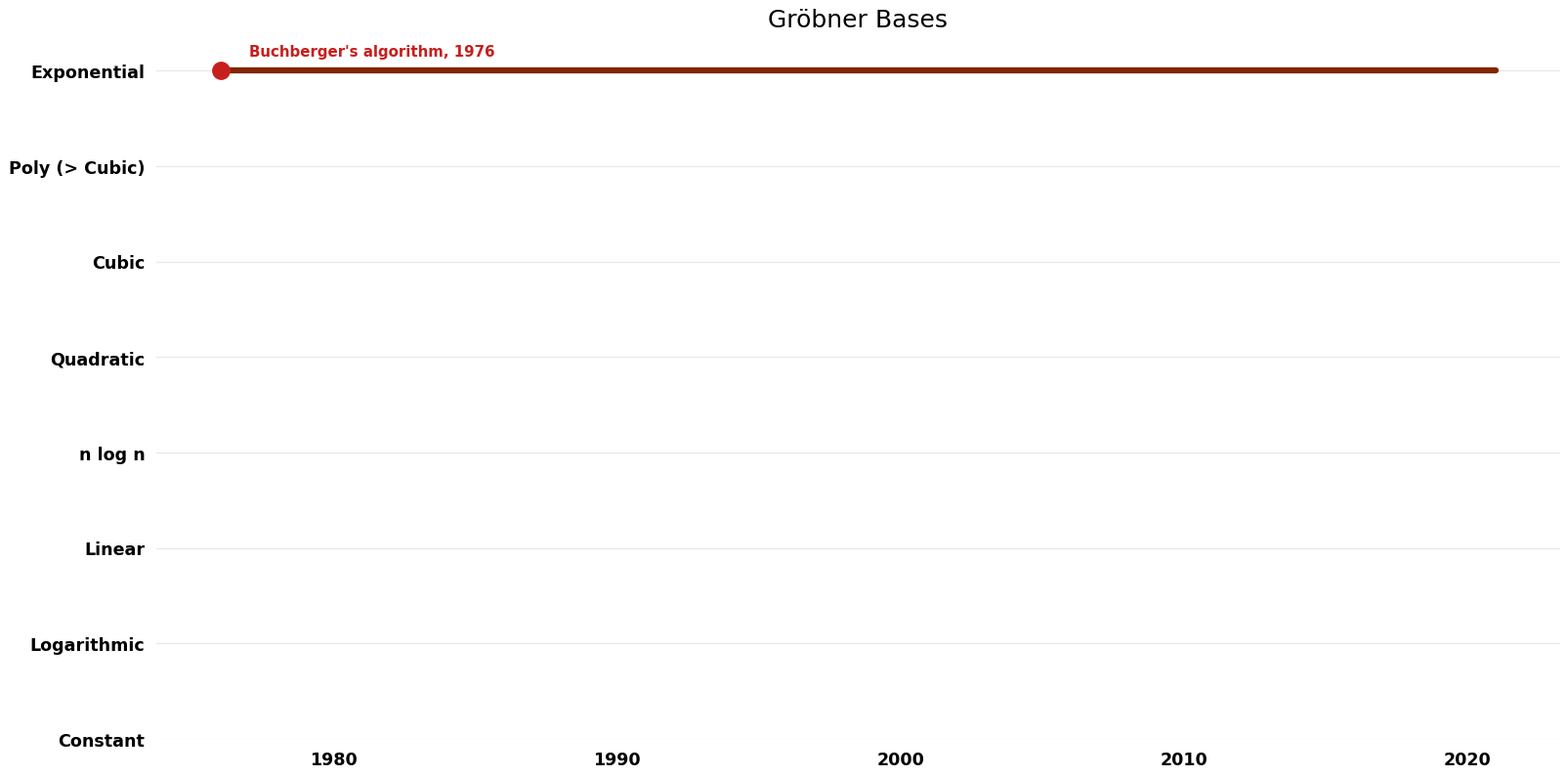Gröbner Bases: Difference between revisions
Jump to navigation
Jump to search
No edit summary |
No edit summary |
||
| (One intermediate revision by the same user not shown) | |||
| Line 6: | Line 6: | ||
== Parameters == | == Parameters == | ||
n: number of variables in each polynomial | $n$: number of variables in each polynomial | ||
d: maximal total degree of the polynomials | $d$: maximal total degree of the polynomials | ||
== Table of Algorithms == | == Table of Algorithms == | ||
| Line 20: | Line 20: | ||
| [[Buchberger's algorithm (Gröbner Bases Gröbner Bases)|Buchberger's algorithm]] || 1976 || d^{({2}^{(n+o({1})})}) || d^{({2}^{(n+o({1}))})}?? || Exact || Deterministic || [https://dl.acm.org/doi/10.1145/1088216.1088219 Time] | | [[Buchberger's algorithm (Gröbner Bases Gröbner Bases)|Buchberger's algorithm]] || 1976 || d^{({2}^{(n+o({1})})}) || d^{({2}^{(n+o({1}))})}?? || Exact || Deterministic || [https://dl.acm.org/doi/10.1145/1088216.1088219 Time] | ||
|- | |- | ||
| [[Faugère F4 algorithm (Gröbner Bases Gröbner Bases)|Faugère F4 algorithm]] || 1999 || $O(C(n+ | | [[Faugère F4 algorithm (Gröbner Bases Gröbner Bases)|Faugère F4 algorithm]] || 1999 || $O(C(n+D_{reg}, D_{reg})$^{\omega}) where omega is the exponent on matrix multiplication || $O(C(n+D_{reg}, D_{reg})$^{2})? || Exact || Deterministic || [https://linkinghub.elsevier.com/retrieve/pii/S0022404999000055 Time] | ||
|- | |- | ||
| [[Faugère F5 algorithm (Gröbner Bases Gröbner Bases)|Faugère F5 algorithm]] || 2002 || $O(C(n+ | | [[Faugère F5 algorithm (Gröbner Bases Gröbner Bases)|Faugère F5 algorithm]] || 2002 || $O(C(n+D_{reg}, D_{reg})$^{\omega}) where omega is the exponent on matrix multiplication || $O(C(n+D_{reg}, D_{reg})$^{2})? || Exact || Deterministic || [https://dl.acm.org/doi/10.1145/780506.780516 Time] | ||
|- | |- | ||
|} | |} | ||
| Line 29: | Line 29: | ||
[[File:Gröbner Bases - Time.png|1000px]] | [[File:Gröbner Bases - Time.png|1000px]] | ||
Latest revision as of 10:07, 28 April 2023
Description
In mathematics, and more specifically in computer algebra, computational algebraic geometry, and computational commutative algebra, a Gröbner basis is a particular kind of generating set of an ideal in a polynomial ring $K(x_1, \ldots ,x_n)$ over a field $K$. As an algorithmic problem, given a set of polynomials in $K(x_1, \ldots,x_n)$, determine a Gröbner basis.
Parameters
$n$: number of variables in each polynomial
$d$: maximal total degree of the polynomials
Table of Algorithms
| Name | Year | Time | Space | Approximation Factor | Model | Reference |
|---|---|---|---|---|---|---|
| Buchberger's algorithm | 1976 | d^{({2}^{(n+o({1})})}) | d^{({2}^{(n+o({1}))})}?? | Exact | Deterministic | Time |
| Faugère F4 algorithm | 1999 | $O(C(n+D_{reg}, D_{reg})$^{\omega}) where omega is the exponent on matrix multiplication | $O(C(n+D_{reg}, D_{reg})$^{2})? | Exact | Deterministic | Time |
| Faugère F5 algorithm | 2002 | $O(C(n+D_{reg}, D_{reg})$^{\omega}) where omega is the exponent on matrix multiplication | $O(C(n+D_{reg}, D_{reg})$^{2})? | Exact | Deterministic | Time |
